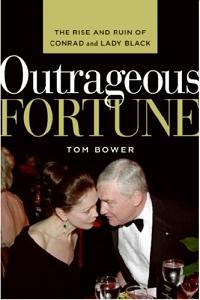Narcissism, wealth, extravagance, fraud
 Outrageous Fortune
Outrageous FortuneThe Rise and Ruin of Conrad
and Lady Black
By Tom Bower, HarperCollins
Reviewed by Cecil Johnson
Baron Black of Crossharbour, a.k.a. Lord Black, or simply Conrad Black, may soon have to suffer some of those "slings and arrows of outrageous fortune" to which William Shakespeare referred in Hamlet.
That will depend upon the findings of a jury in Chicago in March, when Black stands trial on eight counts of fraud. And based upon the blistering account of Black and his wife offered by London-based historian, journalist and broadcaster Tom Bower in his new book, Outrageous Fortune: The Rise and Ruin of Conrad and Lady Black, there is little doubt what verdict the author expects.
Should a life behind prison walls be in store for her husband, Lady Black, a.k.a. Barbara Amiel, could have some wrenching decisions to make about what to wear when she visits him there, given her love for exquisite and expensive attire. Bower quotes a writer in the Globe and Daily Mail about Mrs. Black's sartorial tendencies:
"Only a few hundred women in the world can afford to dress like Mrs. Black, and Mrs. Black may not be among them."
In Bower's much-less-than-flattering portrait, her taste in clothes, jewelry, cars and homes, as well as her fondness for traveling in high style and entertaining lavishly, contributed to the shady wheeling and dealing to which Black resorted to live a billionaire's lifestyle.
But Bower asserts that Lady Black's extravagance, which by her own boasting knew no bounds, was not the root cause of Black's behavior.
Bower portrays Black as a rich, spoiled, narcissistic man living substantially beyond his means and pursuing a lavish, social-climbing lifestyle by tapping the resources of companies he partially owned long before he met and married the serially married and sexually adventurous Amiel.
Black made his reputation as something of a business wizard by buying and selling numerous newspapers, including the London Daily Telegraph, the Chicago Sun-Times, and the Jerusalem Post. He bought scores of smaller papers and, as Bower tells it, raked off profit to support his lifestyle by having a hatchet man cut staffs to the bone and imposing draconian restrictions on the use of supplies, equipment and time.
Indeed, Bower shows Black as doing little or nothing in the way of managing any of his companies; rather, he borrowed, moved around, and skimmed off money to support his empire-building, his social-climbing, his homes, his jet planes, and his expensive second wife.
One image that fits the book's theme is a picture of the Blacks' arriving at a fancy dress picnic in 1999 at Kensington Palace costumed as Cardinal Richelieu and Marie Antoinette.
The high point of Black's social-climbing came when, after renouncing his Canadian citizenship, Black was made a British peer. It was also a psychological milestone for Mrs. Black. Bower speculates about her thoughts on that occasion:
"As she sat in the gallery of the House of Lords on 31 October 2001 watching Conrad Moffitt Black swearing the oath to become Baron Black of Crossharbour, Barbara Amiel could have been forgiven for thinking of how the shop assistants in London, New York and Paris would thereafter address her as Lady Black, and how the butlers opening the front doors of their four homes would ask, 'Do you wish to see His Lordship or Her Ladyship.' "
Unlike Lord Black, who was born into wealth and prominence, Lady Black rose from a hardscrabble background and clawed her way up with her wits, her audacity as a journalist, her physical beauty, and her sexuality.
Barbara Amiel started out as a parlor communist, Bower discloses, only to wind up as a conservative and champion of the causes of the rich. Bower wrote that she came, like Conrad Black, to hold the lower classes in contempt, and to view anyone who criticized their behavior or values as merely envious.
Black's reported disdain for ordinary people propels this speculation from Bower about what lies in store for Black during his trial in Chicago:
"On 5 March 2007, this modern-day Houdini expects the curtain to rise on his greatest performance. Fate determined that Lord Black's life would be judged by a jury of common men and women, rather than his peers."
To classify Outrageous Fortune as an unflattering biography of a famous pair would be to carry understatement to its extreme. No, this is not a warts-and-all book. It is all warts and fascinating reading.
This review originally appeared in the Fort Worth Star-Telegram.

<< Home